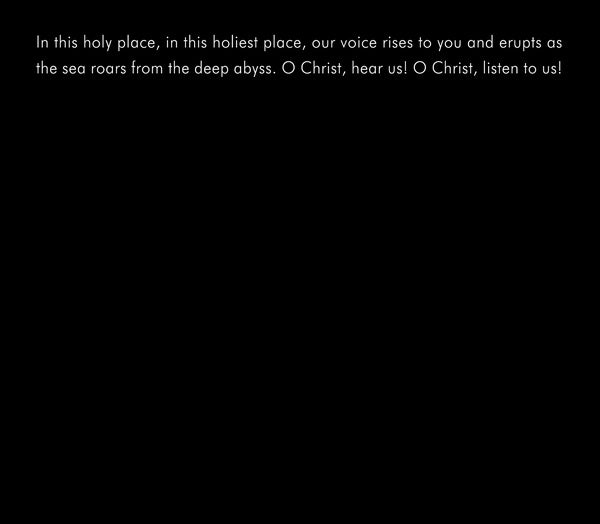1
/
of
1
ZMIJEWSKI, ARTUR - Singing Lesson
Regular price
$18.00 USD
Regular price
Sale price
$18.00 USD
Unit price
/
per
Pickup available at 1367 Greene Ave
Usually ready in 2-4 days
"First published as a vinyl LP in 2011 (Tochnit Aleph) this extraordinary work by Polish conceptual artist Artur Żmijewski is available on CD. Eight-panel digipak; edition of 300.
From the liner notes: "In 2001, Artur Żmijewski created the first part of the project 'Singing Lesson' in the Augsburg Evangelical Holy Trinity church in Warsaw. Accompanied by an organ a choir of 'deaf-mute' children sang the 'Kyrie' from the 'Polish Mass' by Jan Maklakiewicz (1899-1954). Among the cacophony of sounds uttered by them you can hear the words of the confession of faith: 'In this holy place, in this holiest place, our voice rises to you and erupts as the sea roars from the deep abyss. O Christ, hear us! O Christ, listen to us!' The second part of the project ('Deaf Bach') was realized in 2002 in St. Thomas Church in Leipzig, in which Johann Sebastian Bach for many years was a cantor and where he was buried. 'Deaf-mute' or severely hearing-impaired children sang Bach's cantata 'Herz und Mund und Tat und Leben' (Heart and Lips and Deed and Life)."
Violetta Sajkiewicz: "Along with admiration for the efforts of the deaf we feel an uneasiness caused by our deeply hidden aversion towards that which -- like cripplehood -- was removed from our consciousness: fear of ourselves, which is an inner mold of repulsion projected onto outside phenomena. Żmijewski's works convince us that neither suffering nor different kinds of physical dysfunction or social norms are able to kill the joy of life. The children singing Bach every so often snort with laughter as if they were trying to accustom themselves to the situation in which they found themselves, thus making it 'normal'. They whoop it up, forgetting the fact that the lesson in which they participate is beyond the social role ascribed to them, that it is an anomaly, a freaky idea. It is also a musical hybrid, a mix of the sounds uttered by the deaf children and the voice of a professional singer, a negation of all the rules, a mixture of the evenly-tempered baroque system and elements of modal and atonal music."" -Tochnit Aleph.
View full details
From the liner notes: "In 2001, Artur Żmijewski created the first part of the project 'Singing Lesson' in the Augsburg Evangelical Holy Trinity church in Warsaw. Accompanied by an organ a choir of 'deaf-mute' children sang the 'Kyrie' from the 'Polish Mass' by Jan Maklakiewicz (1899-1954). Among the cacophony of sounds uttered by them you can hear the words of the confession of faith: 'In this holy place, in this holiest place, our voice rises to you and erupts as the sea roars from the deep abyss. O Christ, hear us! O Christ, listen to us!' The second part of the project ('Deaf Bach') was realized in 2002 in St. Thomas Church in Leipzig, in which Johann Sebastian Bach for many years was a cantor and where he was buried. 'Deaf-mute' or severely hearing-impaired children sang Bach's cantata 'Herz und Mund und Tat und Leben' (Heart and Lips and Deed and Life)."
Violetta Sajkiewicz: "Along with admiration for the efforts of the deaf we feel an uneasiness caused by our deeply hidden aversion towards that which -- like cripplehood -- was removed from our consciousness: fear of ourselves, which is an inner mold of repulsion projected onto outside phenomena. Żmijewski's works convince us that neither suffering nor different kinds of physical dysfunction or social norms are able to kill the joy of life. The children singing Bach every so often snort with laughter as if they were trying to accustom themselves to the situation in which they found themselves, thus making it 'normal'. They whoop it up, forgetting the fact that the lesson in which they participate is beyond the social role ascribed to them, that it is an anomaly, a freaky idea. It is also a musical hybrid, a mix of the sounds uttered by the deaf children and the voice of a professional singer, a negation of all the rules, a mixture of the evenly-tempered baroque system and elements of modal and atonal music."" -Tochnit Aleph.


